If you’re currently researching the VA home loan program, you might have also seen it referred to as a “VA-guaranteed mortgage loan.” This is a subject that tends to generate a lot of questions from home buyers and borrowers.
Some of those common questions include:
- How is a VA loan guaranteed?
- Does the guarantee protect the lender or the borrower?
- How does the borrower benefit from all of this?
As a borrower, it’s crucial to understand how the VA loan program works, and that includes the guarantee aspect of it. While the federal guarantee does not directly protect the borrowers who use this program, it does benefit them in other ways. So, let’s explore this topic in detail.
A Brief Introduction to VA Loans

A “VA loan” can be termed as a mortgage loan that is guaranteed or backed by the federal government via the U.S. Department of Veterans Affairs. These loans are available to most military members and veterans, along with certain eligible spouses.
The VA loan program offers borrowers several significant benefits, including owning real estate with no down payment. It also provides flexible qualification criteria and allows borrowers to avoid paying mortgage insurance.
When it comes to a VA home loan, there are basically three main parties involved. There’s the borrower, the lender, and the federal government.
Mortgage lenders in the private sector offer the actual funding, the same as most other types of home loans. However, the U.S. Department of Veterans Affairs gives those lenders a partial guarantee that protects them from losses relating to borrower default.
There are several benefits of a VA loan;

1. No Down Payment Required
You most often do not require a down payment for VA loan. Zero down payment on a house loan is a significant benefit, especially for lower-ranking junior enlisted soldiers.
In some instances, a down payment is necessary; your FICO ratings and credit history may influence whether a lender would provide you with a no-money-down loan (lender credit rules apply).
Sometimes, money is demanded upfront because the asking price of the house exceeds the appraised worth. In such circumstances, the borrower must pay the difference in cash.
2. Interest-rate Reduction Refinancing Loans
Moreover, the VA allows interest-rate reduction refinancing loans! These are similar to standard simplified refinance loans available via various government housing programs and traditional lenders.
Refinancing loans are designed to assist seasoned house purchasers in refinancing existing mortgages to obtain a lower interest rate and significantly reduce monthly mortgage payments.
The VA streamline refinancing is only available for existing VA mortgages. Still, VA applicants can also seek to refinance a non-VA mortgage with a cash-out or no-cash-out refinancing loan.
3. Exempted Financing Fee
Borrowers who receive or are eligible for any VA compensation for service-connected disability can be excluded from paying the financing fee.
For a better understanding, you can consider a no-money-down VA loan without any down payment or funding fees. Many military members qualify for the exemption because they are VA-rated handicapped veterans, but many of them may be awaiting a final decision from the VA when applying for a VA mortgage.
If your VA rating has not been made official when it comes time to pay the financing fee, you may be forced to pay the charge and then seek a refund (which is not automatic) after the VA disability rating is formally established.
4. Flexible Closing Fees
Closing fees are unavoidable, regardless of mortgage type. The VA restricts the fees and expenditures that veterans can pay at the time of closure.
One of the benefits of VA loans is that the homebuyers can request that sellers pay all loan-related closure costs and up to 4 percent of the purchase price for expenses such as prepaid taxes and insurance, collections, and judgments.
Conditions to Qualify for VA Loans
There are certain conditions that you must fulfill to qualify for VA loans.
VA lenders normally prefer that you spend less than 41% of your gross monthly salary on large debts like a mortgage or school loans. However, it is feasible to have a greater DTI ratio and still acquire a VA home loan.
Some lenders may lend up to 55% or more, depending on your credit score and capacity to meet extra income requirements. This added flexibility may make it simpler for purchasers to fully leverage their purchasing power.
Who Guarantees VA Loans?

As mentioned above, VA loans are guaranteed through the United States Department of Veterans Affairs, which is one of the cabinet-level departments of the U.S. government. They are sometimes referred to as the “guaranteeing agency” when it comes to VA home loans.
It’s important to understand that the Department of Veterans Affairs does not directly lend money to borrowers. However, they established the guidelines for this program and backed the loans made by private lenders.
As it explains in VA Pamphlet 26-7, the official handbook for lenders:
“VA-guaranteed loans are made by private lenders such as banks, savings and loan associations, or mortgage companies. To get a loan, you apply to the lender. If the loan is approved, VA guarantees the loan when it is closed. The guaranty means the lender is protected against loss if you or a later owner fail to repay the loan.”
(Usage notes: “Guarantee” is both a verb and a noun. “Guaranty” is a spelling variant for the noun form and is often used in a legal context. As you can see in the above quote, the Department of Veterans Affairs switches back and forth depending on the context. But for simplicity, we will stick with the “guarantee” spelling throughout this article.)
Who Does the Guarantee Actually Protect?
The government guarantee associated with VA home loans protects the mortgage lender that generates the loan. Specifically, it covers them from financial losses resulting from borrower default.
(In a mortgage lending context, a “default” occurs when the borrower/homeowner fails to make their monthly mortgage payments.)
However, the VA loan guarantee does not protect the borrower. This is a common misconception, so it’s crucial for borrowers to understand the distinction here. The partial guarantee provided by the Department of Veterans Affairs is designed to protect mortgage lenders, not borrowers.
Even so, the government backing associated with these loans does provide some major benefits for borrowers. So, let’s talk about that next.
How Does It Benefit the Borrower?

The federal guarantee associated with VA mortgage loans essentially minimizes the risk for mortgage lenders that participate in this program. It guarantees reimbursement of a part of the loan if the borrower fails to pay the installment and the lender forecloses on the property.
Due to this added layer of protection, mortgage lenders can deliver more favorable terms to borrowers. This can include a lower interest rate, more flexible qualification criteria, and the biggest benefit—no down payment.
Compared to a conventional mortgage loan not backed by the government, VA loan requirements tend to be much more “forgiving” regarding past credit issues. So, you don’t need flawless credit for this program, as VA loan eligibility is highly accessible.
For better understanding, here is one example: honorably discharged veterans can be eligible for VA-guaranteed home loans depending on their active-duty service time and length.
VA loans also feature attractive interest rates; since 1992, VA has been authorized to let the borrower and lender negotiate the interest rate charged for a VA-guaranteed loan.
Without the VA’s guarantee, lenders would likely impose stricter criteria for borrowers.
Home purchasers who use a VA loan can finance up to 100% of their purchase costs. This eliminates the need for a down payment and allows buyers to purchase a home sooner rather than later. It also removes one of the biggest obstacles to homeownership, the out-of-pocket upfront expense.
It’s the VA loan guarantee that makes all of this possible!
VA loans are highly beneficial for elderly veterans who need assistance navigating the complex loan procedures, as the VA offers foreclosure avoidance advocacy with reliable rental agent and staff members who can advocate on your behalf.
Moreover, this VA loan guarantee allows users to avail the benefits of loans without paying any VA loan PMI (private mortgage insurance).
How Does the Funding Fee Tie Into This?
When a borrower defaults on a VA loan, the Department of Veterans Affairs steps in to compensate the lender for losses up to a certain amount. Depending on the size of the loan and other factors, they might provide a guarantee ranging from 25% to 50% of the loan amount.
To help offset the expense of these reimbursements, most VA loan borrowers are required to pay a financing charge.
This fee typically ranges from 1.25% to 3.3% for a home purchase loan. It’s a single-time fee that can be paid upfront or rolled into the loan. According to VA.gov: “This fee helps to lower the cost of the loan for U.S. taxpayers since the VA home loan program doesn’t require down payments or monthly mortgage insurance.”
As you can see, the entire VA loan program revolves around the government’s guarantee. Without it, this program would cease to exist and would no longer provide an essential benefit to service members.


 How to Buy a Condo Unit with a VA Mortgage Loan
How to Buy a Condo Unit with a VA Mortgage Loan 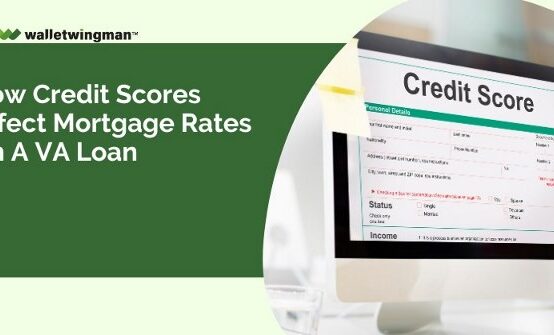 How Credit Scores Affect Mortgage Rates on a VA Loan
How Credit Scores Affect Mortgage Rates on a VA Loan 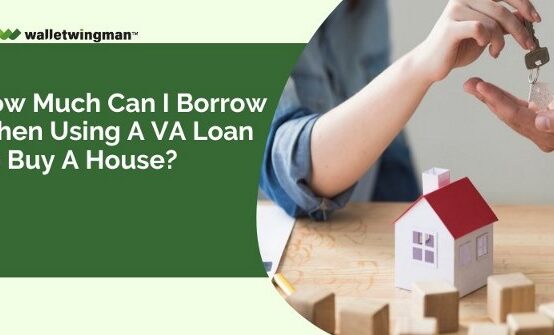 How Much Can I Borrow When Using a VA Loan to Buy a House?
How Much Can I Borrow When Using a VA Loan to Buy a House? 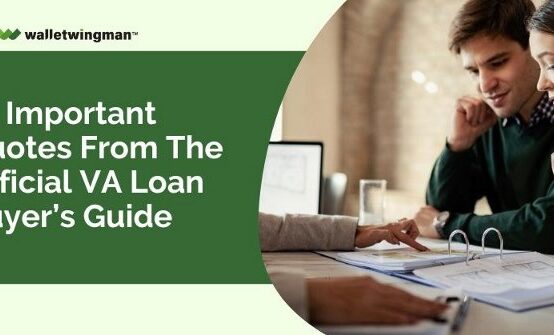 10 Important Quotes from the Official VA Loan Buyer’s Guide
10 Important Quotes from the Official VA Loan Buyer’s Guide 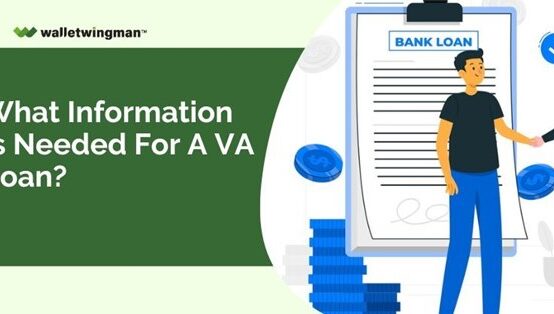 What Information Is Needed for a VA Loan?
What Information Is Needed for a VA Loan? 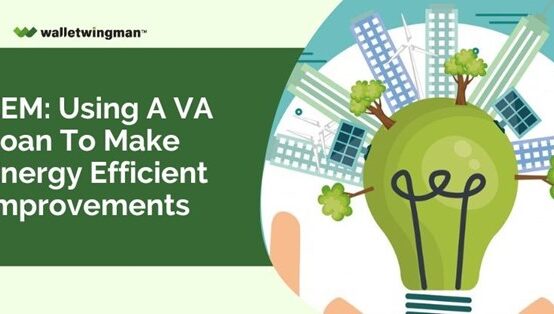 EEM: Using a VA Loan to Make Energy Efficient Improvements
EEM: Using a VA Loan to Make Energy Efficient Improvements 